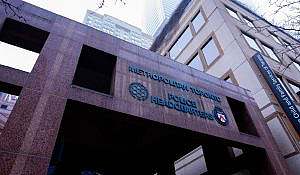Bill33: Power grab and cops in schools
Alright. It was a phenomenally irresponsible and stupid decision on the part of the Brant Haldimand Catholic DSB for trustees to wing off to Italy to buy $100K worth of artwork. It was reckless for the Thames Valley DSB to pay about $40K so that senior staff could go to a retreat at a hotel inside the Rogers Centre last fall. So, let’s get that out of the way: those responsible need to face the consequences of their rank stupidity and arrogance.
And that’s what happened. The Minister of Education, Paul Calandra put the Thames Valley Board under ministry supervision and ordered the Brant Haldimand Catholic Board to repay the citizens’ money it so foolishly spent.
So why does the Ford government need yet another tool to squeeze the life out of school boards across the province?
Damn those boards again; they handed the Tories the appearance of a reason to introduce Bill 33, Supporting Children and Students Act. It makes some changes to other acts like requiring children’s aid societies to get permission for certain financial transactions, colleges to assess applicants based on merit and expands the provincial Ombudsman’s functions related to young people.
But the section of the bill to do with education is positively Trumpasitic if you look at the effects of pounding the financial hell out of school boards, blaming them for their problems and then coming up with a Draconian plan to get them to smarten up. Over 40 percent of the boards across the province faced deficits for the 2024- 25 school year thanks largely to the Ford government which has shorted them to the tune of about $1 500 per student since it came to power in 2018. The cumulative funding gap since then amounts to a remarkable $6.35 billion in light of inflation.
Taking over
Paul Calandra wants to fix things by making it easier for his Ministry to put school boards under its supervision, to take over, among other things, its day to day operations, finances, appointments and dismissal of employees, its pension funds and more. If you read Bill 33, it’s clear that easier means expanding the Minister’s latitude to acquire power.
 The Minister may now investigate, make demands of and take over a school board if in their opinion “boards, board members and directors of education are not carrying out their duties under this (Education)Act in an appropriate manner” if they have “done or omitted to do something or are likely to omit to do something that could affect the public interest” which includes areas like student achievement, finances, governance, day to day management and school programmes. What’s different about Bill 33 from the relevant sections of the existing Education Act is that public interest is mediated by the Minister’s “opinion” and open to “any other matter that may be prescribed.” It’s vague and more open to politics than even the unamended Education Act. When Doug Ford sought to distract attention from an Indigenous demonstration over Grassy Narrows last Fall, he professed to be outraged about students attending what he called a pro-Palestinian rally. They should be sticking to “reading, writing, spelling, arithmetic, the whole shebang,” he said. That field trip was investigated right away and a report released last month.
The Minister may now investigate, make demands of and take over a school board if in their opinion “boards, board members and directors of education are not carrying out their duties under this (Education)Act in an appropriate manner” if they have “done or omitted to do something or are likely to omit to do something that could affect the public interest” which includes areas like student achievement, finances, governance, day to day management and school programmes. What’s different about Bill 33 from the relevant sections of the existing Education Act is that public interest is mediated by the Minister’s “opinion” and open to “any other matter that may be prescribed.” It’s vague and more open to politics than even the unamended Education Act. When Doug Ford sought to distract attention from an Indigenous demonstration over Grassy Narrows last Fall, he professed to be outraged about students attending what he called a pro-Palestinian rally. They should be sticking to “reading, writing, spelling, arithmetic, the whole shebang,” he said. That field trip was investigated right away and a report released last month.
The Ministry has put school boards like the Thames Valley DSB under supervision as recently as the end of April. In 2022 the same thing happened to the Peel DSB when the Ministry decided its response to dealing with anti-Black racism was inadequate. The Toronto DSB was placed under supervision in 2002, when it didn’t balance its budget. So, how much more power does Paul Calandra need? This is just an intimidation tactic.
Naming schools
In the picayune oversight department, Paul Calandra’s Bill 33 says that school boards must apply to the Ministry for approval to name a new school or change that of an existing one. The Ministry may reject such names. This even applies to a new school name used after January 1, 2025. There’s no reason presented for this, so I can only guess that the Ford government doesn’t want to see names it doesn’t like on the fronts of schools: “Highway 413 Memorial School” or “Greenbelt Scandal School” come to mind. Maybe it just doesn’t like the DEI notion of naming schools after prominent members of minority groups or God forbid, liberals. But this does illustrate the power play going on here. Maybe this will become a fundraising option as wealthy donors can have their names stuck to a school – for a price.
Cops in Schools
The most eye-catching part of Paul Calandra’s legislation is its intention to mandate the School Resource Officer (SRO) programme for each school board. He offered no rationale for this controversial arrangement; his communication staff didn’t respond to my question about it. Bill 33 just says that school boards must let local police enter schools, participate in programmes and run SRO programmes. All-important details, as usual, are left to Ministerial regulations.
One recent mention of it comes from a motion by PC Kitchener South-Hespeler MPP, Jess Dixon passed 56 to 27 that encouraged boards to partner with local police services. Her main rationale for the motion was that “a police uniform could become a symbol of security and reassurance for all.”
I doubt that. In 2021, worried about human rights concerns, Ottawa-Carleton DSB trustees voted to end its 20 year SRO relationship with Ottawa Police. School boards in Hamilton, London and Waterloo Region have shuttered their programmes. In 2017, the Toronto DSB reversed an earlier decision to allow SROs in its schools and pulled the plug on the programme. At the time, trustee Tiffany Ford said the relationship with local cops was flawed because it concentrated on schools in the most marginalized and racialized areas of the city. “Our schools are meant to reinforce the power of education and not the power of stigmatization,” she told her colleagues.
Now that decision has been taken from school boards.
 But the problems aren’t going anywhere. Neethan Shan, chair of the TDSB told me that police officers working with kids in schools could just as easily be watching out for family members in some sort trouble with the law. As Chris Chandler, an executive officer with Ontario Secondary School Teachers Federation (OSSTF) noted, cops could be looking for undocumented kids whose families they could report to the Canada Border Services Agency (CBSA).
But the problems aren’t going anywhere. Neethan Shan, chair of the TDSB told me that police officers working with kids in schools could just as easily be watching out for family members in some sort trouble with the law. As Chris Chandler, an executive officer with Ontario Secondary School Teachers Federation (OSSTF) noted, cops could be looking for undocumented kids whose families they could report to the Canada Border Services Agency (CBSA).
TDSB trustee Michelle Aarts wrote to me about SROs who end up disciplining kids: “SROs disproportionately impact students with disabilities who are disciplined or arrested at nearly 3X the rate of non-disabled peers, with similar impacts to black youth compared to white peers”. Andrea Vásquez Jiménez of Policing-Free Schools said that if police are let back into schools it will create an “unaccountable access to youth by cops.”
Research on SROs across North America is mixed, but problems include escalating routine disciplinary issues to arrests, 1 more contact with the justice system that reinforces the school to prison pipeline, 2 as well as targeting and criminalizing Black students.3
Mandating SROs does nothing other than take more power from school boards to manage their affairs, especially those who believe that they have a responsibility not to encourage gun-toting police with the power of arrest, to roam around schools. What makes this play egregiously cynical is watching TDSB trustees at a recent budget meeting discuss cuts to school safety monitors along with child and youth workers. The very people it needs, the Ministry takes away.
The Ministry of Education ought to convene meetings around the province to have serious discussions about the funding schools need in order to be safe, useful to their communities and able to provide an equitable education for their varied populations. But it shows no interest in looking at what areas of education need money and being honest about whether or not it’s prepared to pony up.
For instance, an Ontario Public School Boards Association (OPSBA) report from last week says that every member of its group faces an increased, yet underfunded demand for special education- a $582.7 million draw from local budgets. The same report notes an increase – again unfunded by the Ford government- in Canada Pension Plan (CPP) and Employment Insurance (EI) payments. Unlike the Ministry of Education, school boards are mandated to pay their bills. Adding to these bills is a Ministry that still won’t back off its 8-year moratorium on closing underused schools, something that might enable boards to save money it spends to maintain them.
Rather than face up to its responsibilities, the Ford government has once again chosen to distract us by throwing its weight around, forcing Ontario school boards to bend to its will.
Notes:
- Curran, University of Florida, “Arrests of 6-year-olds shows the perils of putting police in primary schools”, The Conversation, 2029-09-27
- Counts, K Randall et al, Clemson University, “School Resource Officers in public Schools: A National Review” Education and Treatment of Children, Vol 41 #4, November 2018
- Oba, Toronto Metropolitan University, “For a fairer education system, get the police out of schools”, The Conversation, 2020-07-21
More information:
POLICING-FREE SCHOOLS CANADA
https://www.policingfreeschools.ca/
POLICING-FREE SCHOOLS TEACH-IN
Send a letter to Ontario Minister of Education: Do NOT mandate police(ing)-in-schools

